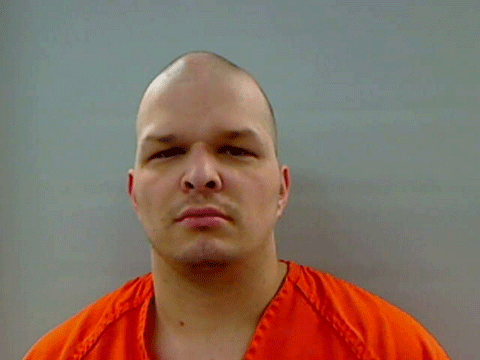 MICHAEL JAMES A recent mugshot from Kennebec County Jail. |
As I finished writing this article, Michael called me from Riverview.
“I couldn’t stand it no more,” he said in an anguished voice. “I kept asking them, but they friggin’ wouldn’t talk to me, so I cut an artery — the same place, in my arm. They took me to the emergency room. I had to have forty stitches.”
Michael said he now had someone to talk with all the time, one-on-one.
Michael James is a very mentally ill man whom the Riverview Psychiatric Center wants to send back to the Maine State Prison, where he still has to serve nine years for burglary, robbery, and assault. The director of the State Forensic Service, a psychologist, says Michael’s fundamental problem is that he makes bad choices, so he can’t be treated.
Deeply scarred on his left arm and on — and inside — his head, Michael vividly illustrates in one man the inhumane failure in Maine and the nation of both the public mental-health and the prison systems, which over 35 years have merged in their role of containing the unruly poor. Michael, 31, has spent most of his life in the custody of one or the other system.
It’s universally accepted that legislatures and Congress never provided adequate funding for community mental-health care, which was supposed to replace the old “snake pit” mental hospitals. Instead, prodigious funding was provided for prisons and jails as their inmates skyrocketed in numbers, many of them mentally ill. The Maine Department of Corrections once said 40 percent of prisoners took psychotropic medicine and 85 percent were mentally ill or drug addicts.
The trend continues: the Legislature is now considering a nearly-$5-million cut in funds for community mental-health agencies. The state’s chief mental hospital, Riverview, in Augusta, operated by the Department of Health and Human Services (DHHS), saw its budget shrink by $2 million from 2009 to 2012. And then last fall it lost $20 million a year in federal funding — half its budget — because of inadequacies in patient treatment and staff and patient safety.
Now the criminalization of the indigent mentally ill in the county jails (those who can’t make bail) has gone so far that they can be sent directly to prison, if they act out enough, even before being convicted of a crime. Last year the Legislature expanded the state prison’s Mental Health Unit to receive this population and others who create jail disturbances.
And in the current legislative session, several Democratic leaders even sponsored a bill that would have allowed the state to send “civil” mentally ill people — in no way involved with the criminal-justice system — to a jail mental-health ward. It was killed after an outcry from civil-liberties advocates.
In the early 1800s and for centuries earlier, asylums and prisons were undifferentiated. They contained a hideous mix of criminals, the insane, the homeless poor, prostitutes, and the otherwise deviant. As the century progressed, Dorothea Dix, of Hampden, Maine, became internationally famous for separating out care for the insane and for treating them as mentally ill.
But American society has been returning to the old system. In Mount Auburn Cemetery in Cambridge, Massachusetts, Dorothea Dix is turning over and over in her grave.